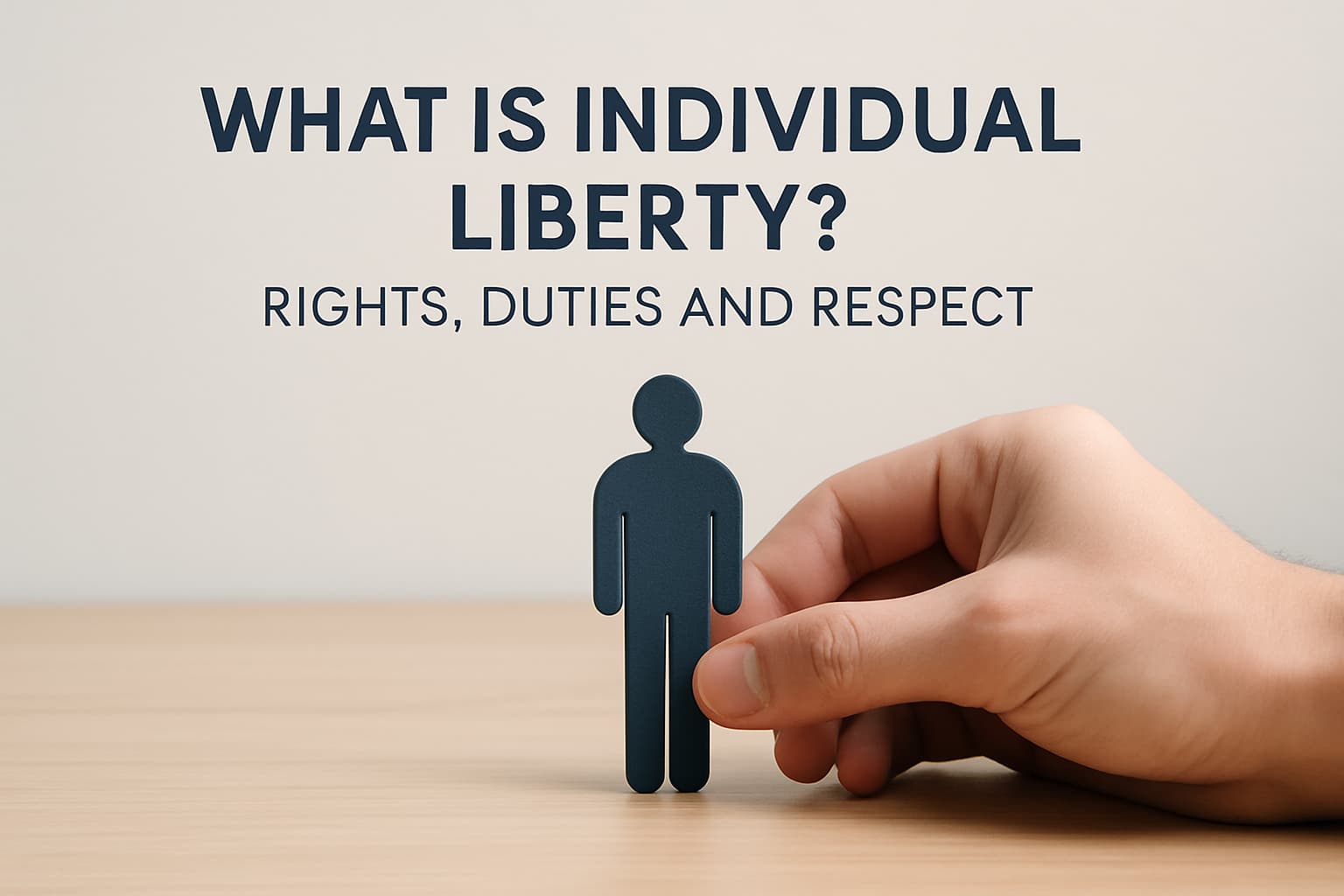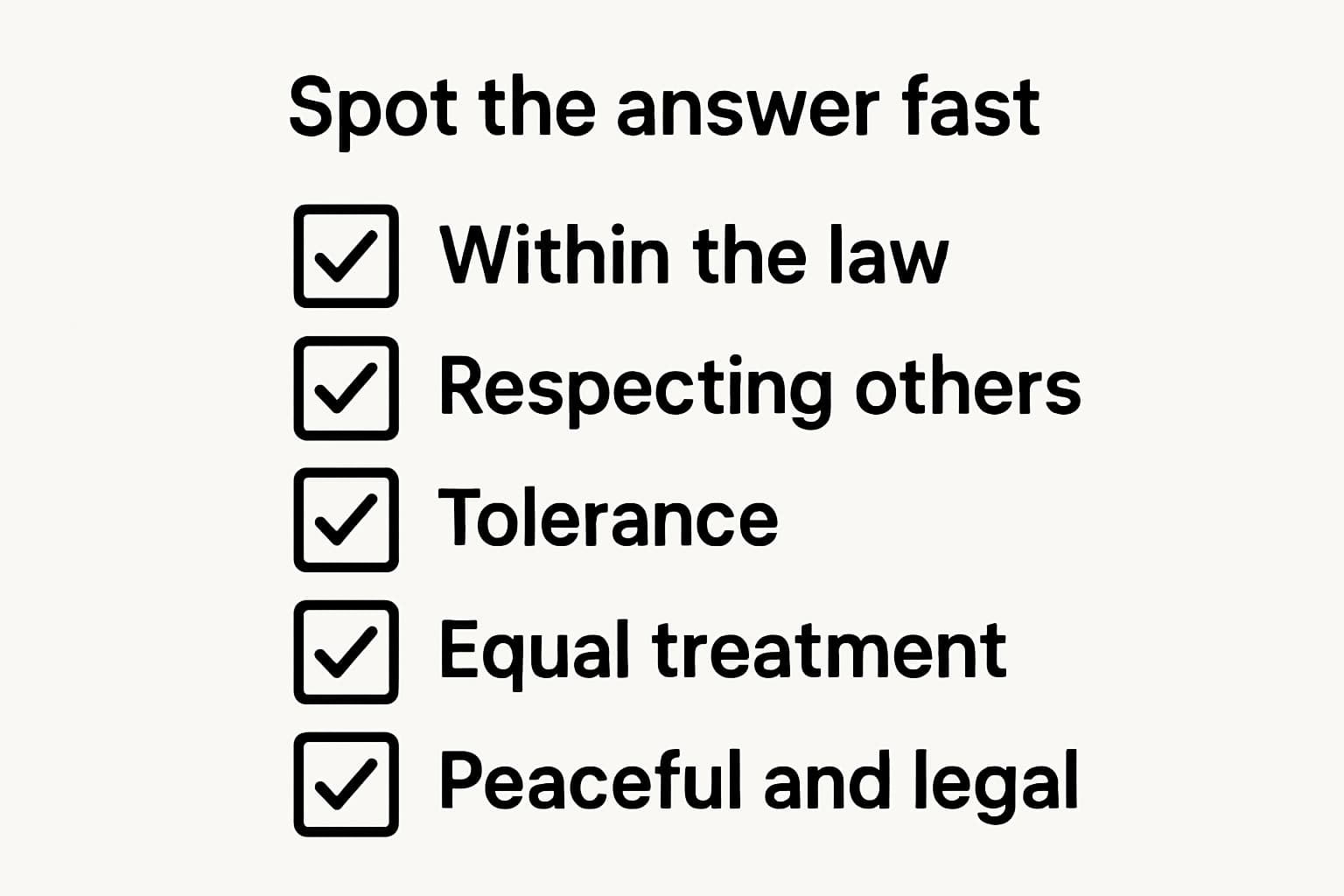What Is Individual Liberty? Rights, Duties and Respect

If you are revising British values for the Life in the UK Test, you will meet the idea of individual liberty. This guide explains what is individual liberty in clear, test-ready terms, shows how it sits alongside mutual respect, and gives examples, exam signals, and short practice items. By the end, you will know the wording the handbook favors and how to choose the best answer under time pressure.
Core Definition from the Official Handbook
Short answer for the test: Individual liberty means people in the UK are free to make choices and express beliefs within the law, while respecting the rights and freedoms of others.
In the Life in the UK Handbook (3rd edition), individual liberty is presented as one of the core British values alongside democracy, the rule of law, and mutual respect and tolerance. The handbook emphasizes that people can live as they choose, hold different beliefs, and express views, provided they follow the law and do not undermine other people’s rights.
Freedom with responsibility
In test questions, liberty is always paired with responsibility. The handbook’s pattern is consistent: you have rights and freedoms, and you also have duties to obey the law and treat others fairly. A quick way to remember this balance is to connect liberty with lawful choices and courteous conduct.
Freedom | Responsibility |
|---|---|
Choose your beliefs, religion, and opinions. | Do not promote hatred or break the law when expressing them. |
Participate in society and speak up. | Respect others’ rights to do the same. |
Make personal life choices. | Accept consequences if choices break the law or harm others. |
Remember: test answers that include phrases like within the law or respecting the rights of others usually align with the handbook.
Mutual Respect: The Duty That Balances Liberty
Mutual respect means acknowledging that people hold different beliefs, backgrounds and lifestyles, and treating them courteously. In the handbook’s British values, individual liberty is balanced by mutual respect and tolerance. Respect is practical: it is how people use their freedoms fairly in everyday life.
Respect across beliefs and backgrounds
Listen without interrupting when others express views.
Use polite language; avoid insults or discriminatory remarks.
Allow space for different religious practices and none.
Work cooperatively with people from different cultures or beliefs.
These behaviors reflect the handbook’s expectation to be law‑abiding and respectful of others in modern UK society. For more on how schools and services promote these values, see official guidance on promoting British values and SMSC expectations.
Rights and Freedoms in Practice
To score marks, you must convert the abstract idea into “what would be lawful and respectful here?” Think of individual liberty as protected space for choice, balanced by others’ equal claim to the same protection.
Choice and participation within the law
Freedom of belief: Choose any faith or none, attend worship, or change religion, provided you follow the law and respect others’ rights in the process.
Freedom of expression: Share opinions in conversations, online, or at peaceful events that follow police guidance and public‑order laws.
Civic participation: Stand for local groups, join community projects, contact elected representatives, and vote if eligible—always using peaceful and legal means.
Personal choices: Education, work, and lifestyle choices are yours to make within the framework of the law.
When rights intersect: finding the fair balance
In exam scenarios, if two rights clash, the correct answer keeps both within lawful limits. The UK protects fundamental rights while setting boundaries to prevent harm, discrimination or disorder. A fair solution typically:
Allows the expression or activity to proceed within the law.
Requires polite, non‑discriminatory conduct.
Protects others’ access, safety and equal treatment.
For background context on how freedom of expression, assembly and association are framed in UK law, see this government research on shared social values.
Clear-Cut Mutual Respect Examples
Use these simple, handbook‑consistent examples to recognise respectful conduct quickly on test day.
Education settings
Listening to classmates’ views without mocking or interrupting.
Including everyone in group work, sharing speaking time fairly.
Accepting that people may observe different religious holidays.
Work and public spaces
Using courteous language with staff and customers.
Queueing and taking turns on public transport or at services.
Following venue rules designed for safety and equal access.
Community and faith contexts
Allowing peaceful worship and community events to proceed lawfully.
Respecting those with different beliefs—or none—without pressure.
Challenging prejudice and avoiding discriminatory behaviour.
These reflect the UK’s emphasis on combating discrimination and promoting equality in daily life; see an overview of British values in practice.
Exam Signals: Wording That Points to the Right Answer
Look for recurring phrases that match the handbook’s tone. Options that include these often point to the correct choice.
“Within the law,” “respecting others,” “tolerance”
Within the law – indicates lawful limits on freedom.
Respecting others – shows awareness of others’ rights.
Tolerance of different faiths and beliefs – protects diversity.
Equal treatment – fairness and non‑discrimination.
Peaceful and legal – for protests, assemblies, and community action.

These cues also appear across guidance used in education about British values, for example in Prevent-related definitions and early years materials. While the test is based on the Life in the UK Handbook, the wording aligns closely.
Misconceptions That Cost Marks
Two traps often appear in wrong answer choices. Use these corrections to eliminate them fast.
Absolute freedom myth
Incorrect: “Liberty means you can do anything you like.” Correct: Your rights stop where the law and others’ rights begin. The handbook always brings you back to the rule of law and fair treatment. If an option ignores legal limits or other people’s rights, it is almost always wrong. See our guide to the companion value, the rule of law, for how these limits protect everyone.
Politeness vs. endorsement
Incorrect: “Respect means agreeing with everything.” Correct: Respect is courteous behaviour despite differences. You can disagree while staying polite and non‑discriminatory. In the test, choose options that combine courtesy with legal boundaries, not forced agreement.
Targeted Practice: 6 Handbook-Style Questions
These are original items that mirror the wording and tone of the Life in the UK Handbook.
3 definition/meaning items
Q1. What best describes individual liberty in the UK?
A. Doing anything you like without limits
B. Making personal choices within the law while respecting others’ rights
C. Speaking only about non-political topics
D. Agreeing with the majority
Answer: B. Matches the handbook’s “within the law” and “respecting others.”
Q2. Which phrase most closely aligns with mutual respect?
A. Forcing others to change beliefs
B. Polite, non-discriminatory conduct toward people with different beliefs
C. Avoiding anyone with a different culture
D. Staying silent in public
Answer: B. Respect is courteous behaviour despite differences.
Q3. In the handbook’s British values, individual liberty is balanced by:
A. Absolute freedom
B. Mutual respect and tolerance
C. Private beliefs only
D. None of the above
Answer: B. Liberty and respect operate together.
3 scenario items
Q4. A group plans a public event to share their views. What action best reflects liberty and respect?
A. Skip permits and block the road
B. Hold a peaceful, lawful event following police guidance
C. Shout insults at passers-by
D. Prevent other groups from speaking
Answer: B. Peaceful and legal while respecting others.
Q5. In a class debate, two students disagree on religion. Which behaviour matches mutual respect?
A. Interrupting and mocking the other view
B. Listening, responding politely, avoiding insults
C. Demanding the teacher silence one side
D. Leaving the room to avoid discussion
Answer: B. Polite, non‑discriminatory conduct.
Q6. A neighbour dislikes a community festival. What is the lawful, respectful choice?
A. Try to stop it by blocking entrances
B. Allow it to proceed lawfully; give feedback through proper channels
C. Spread threats online to cancel it
D. Demand the group change beliefs
Answer: B. Respects others’ rights while using lawful means to express views.
Use the Life in the UK Test App to Master This Faster
If “values and responsibilities” chapters feel abstract, the Life in the UK Test App turns them into quick drills and realistic mocks so you do not waste time or fees on retests.
Complete handbook content, mobile‑ready: Learn the exact topics the exam covers.
Brit‑Bear smart assistant: Targets weaker areas like individual liberty and mutual respect with personalised practice.
Readiness score: Know when you are genuinely test‑ready.
650+ questions with explanations: Understand why an option is right, not just which one.
Mock tests and Hard Mode: Build stamina and accuracy under pressure, even offline.
Smart study plan with Brit-Bear
Open the app, select the British values topic, and let Brit‑Bear create a short, daily plan that cycles through definition items, scenario questions, and mixed mocks. It adapts when you miss “within the law” or “respecting others” items, reinforcing the exact cues this topic requires.
Mock exams, Hard Mode, and offline revision
Run a timed mock each week, then switch on Hard Mode to mirror the exam feel. Commute or travel? Offline revision keeps progress moving even without signal.
Try it now: Download on App Store: https://apps.apple.com/app/id6743702124 | Get it on Google Play: https://play.google.com/store/apps/details?id=net.briceventures.life_in_the_uk_test. Learn how the app helps you avoid retests.
Summary and Linked Topics
Key takeaway: Individual liberty in the Life in the UK Handbook is freedom with responsibility—people can make choices and express beliefs within the law, while respecting the rights and freedoms of others. Mutual respect is the everyday behaviour that keeps liberty fair for everyone.
Build a strong foundation by revising the related values:
Understand the legal boundaries that protect everyone: What is the Rule of Law?
Know how the exam works: What is the Life in the UK Test?
Revise the full scope: Life in the UK Test Topics: The Definitive Syllabus
Avoid common pitfalls: 7 Common Life in the UK Test Mistakes to Avoid
FAQ
What is individual liberty in the Life in the UK Test?
It is the freedom to make choices and express beliefs within the law, while respecting other people’s rights and freedoms.
How is mutual respect tested?
Through scenarios showing polite, non‑discriminatory behaviour toward people with different beliefs or backgrounds.
What phrases help me pick the right answer?
Look for within the law, respecting others, tolerance, equal treatment, peaceful and legal.
Is individual liberty the same as absolute freedom?
No. Liberty is balanced by the rule of law and other people’s rights. Answers ignoring limits are usually wrong.
How can I revise this faster?
Use short daily drills, realistic mocks and explanations in the Life in the UK Test App, then track your readiness score.